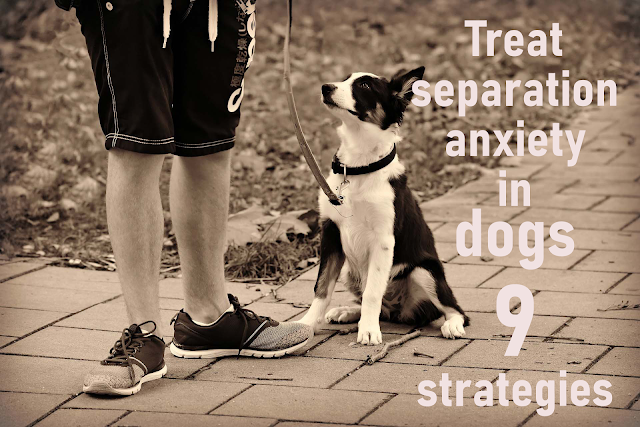For a long time, in almost every dog groups on Facebook or other social media, dog parents have been asking how to get rid of the separation anxiety in dogs. With lock down coming to an end and people getting back to work, this problem of dogs suffering from separation anxiety is on the rise.
Topics covered in this blog post
Causes and treatment of separation anxiety in dogs
Just like any other unhealthy behaviors of dogs like chewing, biting, barking etc. anxiety is treatable. Depending on the circumstance, anxiety can either be totally cured or it can be brought down to manageable levels. If you have a dog who suffers from anxiety, this is a must-read blog post for you.
Furthermore, if you were with your pup during this lock down and have to go back to work now, some of the tips mentioned here might help make the transition easier for your dog.
 |
| 9 amazing strategies to treat separation anxiety in dogs |
First let’s understand what causes anxiety dogs
Anxiety can show itself in many ways from barking and whining to whimpering and shivering. You may notice that your dog suddenly becomes destructive when you are not at home. They may also sure hostile behavior when anxious. If the separation anxiety is not addressed, they may start to lose their appetite and move to a completely withdrawn state.
The most common reasons behind separation anxiety in dogs are:
- Fear of being home alone
- Traveling
- Loud noises
- Being around strange people, pets or children
- Being abused or rejected in the past
The best way to treat your dog’s anxiety is to first understand the cause behind the anxiety. Once you have identified the reason, you can start the treatment.
Ways to calm an anxious dog
Exercise
If your dog suffers from separation anxiety, the most obvious manner to put their minds at ease is to never leave them alone. However this is not a feasible option for most dog guardians. Thus, exercising your dog can not only be a great bonding time, it can also release the pent up energy of your dog.
To reduce your dog’s anxiety by exercise, take your dog for a long walk or run just before you leave the house. Exercise reduces their pent up energy levels, releases endorphins which reduces their stress levels and also tires their brain. If you leave your dog alone after you exercise him or her, your dog will display less aggression and will be more calm and content to being alone.
Physical contact
Physical contact is probably the best and quickest way to reduce anxiety of your dog. If you notice signs of anxiety in your dog, it’s best to nip it as soon as possible. Give your dog plenty of hugs, kisses, cuddles or just long petting sessions. When you’re at home, stay close your dog. Make him or her feel like he or she belongs.
Massage
Massage works wonders for most of us. It is the same for dogs as well. Anxiety often results in tension in the muscles and massage therapy is one of the best ways to alleviate this tension. Giving your dog a good massage session before you leave. It can relieve your dog off the excess energy, make him or her calm and relaxed. A good massage session will most likely make him or her sleep after you leave. Start the massage from the neck and work down with long soothing strokes. Try to keep one hand on your dog and use the other to massage him or her. Over time. you will be able to identify which region of your dog becomes tense due to anxiety and work more on that particular region.
Music therapy
Music therapy has proven to be beneficial for both humans as well as dogs. Music can be relaxing and calming when you’re at home or outside. Music can also reduce the noise sensitivity by masking the scary noises or the street sounds which bother some dogs and cause anxiety. Recent studies have also shown that most dogs prefer classical music. The music notes has been observed to act as a natural sedative for dogs. If you have a dog suffering from anxiety, the following music might help:
Through a dog’s ear by psychoacoustics researcher Joshua Leeds and pianist Lisa Spector.
Surrender by Susan Raimond.
Time out
Timeout isn’t always in response to a bad behavior. If you dog is suffering from anxiety, it might help to give your dog a crucial timeout when he or she is acting out. This timeout needs to be in a safe and quiet environment. Isolating your dog in such an environment can help calm their anxious nerves. It can be an added bonus if a quiet soothing music is playing in the background, the lights are dim and some aromatherapy is available [preferably a fragrance which is liked by your dog].
Calming t-shirts/coats
Calming T-shirts apply a constant and mild pressure to your dog’s torso. It is equivalent to swaddling an infant. Just like swaddling provides a feeling of comfort and security to the baby, the calming t shirts or coats provide a sense of security to dogs who suffer from any kind of anxiety induced by separation, noise, travel or even separate stranger anxiety. Depending on your dog’s size, there are many brands as well as models available from which you can choose.
Remove the triggers which cause anxiety
If you notice your dogs anxiety stems in response to specific things like strangers or other dogs, try to eliminate the stressors for a while. For example if your dog is afraid of other dogs or other people, you can stop going to the dog park. You can take your dog for walks to places where there are less people or less dogs around.
Behavioral modifications towards strangers
You can also reset your dog’s mind to associate new people with positive reinforcements. Ask your friend to come into your house and give your dog a treat every time he or she comes. Repeat this exercise on a regular basis. Eventually your dog will learn to associate new people with good treats.
Behavioral modifications towards being left alone
The standard for behavioral modification usually involves desensitization as well as counter conditioning. Such methods can be tricky to carry out . These methods require the help of a trained and experienced professional. To know more about the behavioral modifications to with being left alone watch out for my next blog post.
Dog appeasing pheromones
These are synthetic pheromones. These are similar to pheromones which are produced by female dogs when they are nursing puppies. These can work amazingly well reducing the anxiety of your dog. These are available in different forms like callers, diffusers and sprays.
Alternative therapies
Alternate therapies are ones which have not being proven scientifically to have a positive effect on your dog’s anxiety. As a part of this therapy, you can either try combining music with calming T-shirts or you can go for homeopathic remedies available which can calm your dog. You can also use CBD oil (know about the full benefits of CBD oil) or try a mix and match of a few of the above-mentioned remedies.
Medications
Two drugs, clomipramine and fluoxetine are approved in the US for treatment of separation anxiety dogs. These two are antidepressant drugs which are also administered to humans for treating symptoms of anxiety and depression. Clomipramine is administered at a dose of 1 mg/kg every 12 hours. Clomipramine has been observed to increase passive behavior and reduce whining, scratching and pacing of dogs suffering from separation anxiety.
Fluoxetine, when administered as soluble tablets, in the absence of any kind of behavioral therapy, was found to improve the separation related anxiety of dogs compared to those who were treated with a placebo.
Always consult your vet before starting your dog on any kind of alternative therapy.
Seek professional help
If you tried all the above therapies and none seem to work on your dog. It is time to seek out professional help. If your dog’s anxiety problem is not addressed at an early age, it will only continue to grow and get worse over time.
Sometimes a sudden behavior change can be a result of a physical problem. Your veterinarian can perform diagnostic tests depending on your dog’s behavior to find out the root cause of your dog’s problem. However, if your dog is healthy physically and still displays a high level of anxiety, you should set up a meeting with either a certified animal behaviorist or with a board-certified veterinary behaviorist. Work together and find out the root cause of your dog’s anxiety. Treat the problem from the root so that your dog can go back to his happy self.
Conclusion
Understanding the reasons behind your dog’s anxiety, ruling out any kind of underlying illness, behavior modification training and getting professional help will help improve the quality of your dog’s life and reduce his or her anxiety.
Research is shown that anxiety can have negative effects of both humans as well as dogs. A study conducted in 2010 on 721 domestic dogs concluded that anxiety disorder or the stress of living in fear can have detrimental effects on your dog’s health and can even reduce their lifespan. Thus, you must be proactive if you have a dog who suffers from anxiety.
As a dog guardian, you know that giving up is never an option. The solution may not be easy, but your dog will get there with your support and be his or her happy, healthy, jumping and tail wagging self again.


10 Comments
Hi,
Greetings!
I have seen this article, it has very impressed me and forcing me to write about it on my https://petcollarsreviews.com and https://reviewsspecialist.com for referring people to your article
Thanks and regards
Thank you so much. I really appreciate it 🙂
Hi there, just became alert to your blog through Google, and found that it is truly informative.
I’m going to watch out for brussels. I’ll be grateful if you continue this in future.
A lot of people will be benefited from your writing.
Cheers!
Thank you so much for your appreciation. It really means a lot.
Outstanding post however I was wondering if you could write a litte more on this topic? I’d be very grateful if you could elaborate a little bit further. Many thanks!
Sure. I’d love to. I hope you have subscribed so that you can be notified when I release an updated version or a new article on separation anxiety in dogs.
Great blog! Is your theme custom made or did you download it from somewhere? A theme like yours with a few simple adjustements would really make my blog jump out. Please let me know where you got your theme. With thanks
I think this internet site has got some very fantastic info for everyone :D. “We rarely think people have good sense unless they agree with us.” by Francois de La Rochefoucauld.
Great work! This is the type of information that should be shared around the internet. Shame on Google for not positioning this post higher! Come on over and visit my site . Thanks =)
All the information given in this blog post is excellent, by practice we can make ourselves perfect. In the same way your pet can also be trained, it is absolutely right to say that the mind of an animal can be trained by practice, thanks for this kind of knowledge.